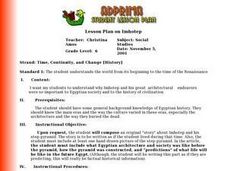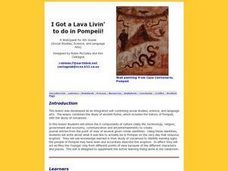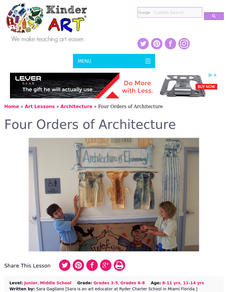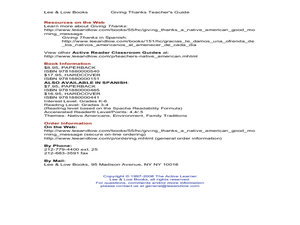Curated OER
Comparative religious Teachings
Ninth graders examine the goods and culture that was traded along the Silk Road. For this World History lesson, 9th graders compare and contrast the belief systems of the Silk Roads. Students analyze a primary text of sacred and...
Curated OER
Ancient Egypt Artifacts: Birmingham Museums and Art Gallery Learning and Outreach
In this Egyptian artifacts worksheet, students study photographs and information from the Birmingham Museum. There are 23 pages, each with a color photograph of an actual artifact and background information. There are no questions.
Curated OER
Microbes & History: Microbial influence on the spread of Civilization
Young scholars explore how to extract plant fibers from the flax plant Linum usitatissimum in the process of making linen fibers. Doing so spark interest in the importance of microbial action on the spread of human culture and civilization.
Curated OER
Discussion Questions for Shakespeare's Julius Caeser
Do not let Julius Caesar be Greek to your pupils. Rather, make the play a dish fit for hungry minds. Encourage your class members to lend their ears to a series of rich discussion questions so that they can become masters of the play, as...
Curated OER
Imhotep
Sixth graders compose an original story about Imhotep and his step-pyramid. They also must include what Egyptian architecture and society was like before the pyramid, how the pyramid was constructed and predictions of what life will be...
Curated OER
Civilizations Leadership
Students view a segment of Prosperity and Decline. They discuss what attributes made the empire strong. Students discuss what caused the fall of the Roman Empire. They write an essay describing the cause of the fall of the Roman Empire....
Curated OER
Elements of Civilization
Students create their own ancient civilizations based off of topographical maps of Egypt, Mesopotamia, the Indus Valley, and the Yellow River. In this social studies lesson, students are assigned one topographical map to use to create...
Curated OER
I Got a Lava Livin' to Do in Pompeii
Scholars imagine themselves as citizens of Pompeii in 79 AD. First they are assigned a job (or place in society like a child or slave). Then they record their daily activities for the weeks leading up to the eruption of Mt. Vesuvius in...
Curated OER
Civilizations of the Americas
Study and compare multiple aspects of both Aztec and Inca civilizations. Young historians explain how each of the empires came to be, and how they were both defeated by the Spanish. The resource starts out as a good lesson, but is...
Education Outside
Papermaking
Imagine recycling food scraps and using them to make paper. The directions are all here in a seven-page packet that details several paper-making strategies.
Curated OER
Architecture is Elementary
Students learn the four orders of architecture: Doric, Ionic, Corinthian and Composite. They create their own 3d structure and work together in groups. They create basic geometric shapes. # Have fun learning about art history,...
Curated OER
Architecture Is Elementary
Students learn the four orders of architecture: Doric, Ionic, Corinthian and Composite and create their own 3D structures in this Art/Art History lesson for fourth through sixth grade. The lesson includes a book resource list for lesson...
Curated OER
Technology of the Times: A Comparison
Tenth graders compare and contrast how changes in technology impacted the growth of ancient civilizations and modern cities. Using internet research, they identify the positive and negative aspects of technology society. At the...
Curated OER
Twentieth-Century Oracles
Students discuss the role of the oracles in Greek society. In groups, they use the internet to research the disagreements of scholoars on describing the importance of the oracles. They also discuss why the Greeks started going to see...
Curated OER
Introduction to Greek Theatre
Students create a tableau for a Greek myth. In this introduction to Greek theatre instructional activity, students discuss the history of Greek theatre and tableau and complete a handout. Students work in groups to choose a myth and...
Curated OER
The Cultural Geography of East Asia
Students use information from the Asia Society's AskAsia Web site to explore the cultures of China, Japan, and Korea. They answer four questions and then use what they have learned to write a letter of introduction to a Japanese exchange...
Curated OER
Number the Stars The Swastika
In this Language Arts worksheet, students read a quote from Number the Stars about a swastika. Students also read a history of how the swastika was once a symbol of peace.
Curated OER
What's Right and Wrong? Moral Messages in Art
Students explore the Steen and Mount paintings and their presentation of moral issues. They discuss ethical debates in society today and write a short position paper on an issue raised by the paintings or in the discussion. They make a...
Curated OER
Poisoned Chalice
Students explore espionage. For this current events lesson, students research various Web sites for information about the history of spy work, Anglo-Russian relations, and spy gadgets.
Curated OER
Prince Hall and His Organization of Black Free Masons in the United States
Students examine the life of Prince Hall who became a member of the Free Masons during the time period of slavery. Depending on the grade level, they are shown pictures or read a reference guide listing the characteristics of each...
Curated OER
Role of "Outsiders" And Traders in Society
Students examine the Chinese and Japanese conceptions of "insiders" and "outsiders" and how this affects the attitude toward foreign traders from the 6th to the 16th centuries. Lesson extensions are included.
Curated OER
Lee & Low Books: Giving Thanks Teacher's Guide
Fourth graders participate in reading comprehension activities associated from a teacher's guide. In this reading comprehension lesson, 4th graders read Giving Thanks: A Native American Good Morning Message by Chief Jake Swamp and...
Curated OER
Democracy: An Introduction.
Students study the U.S. Constitutional System and how it compares with forms of democracy that developed in ancient Greece and Rome. They list and explain the requirements it takes to form a society to be considered a nation.
Other popular searches
- Ancient Societies 5th Grade
- Ancient Societies Legacies
- Ancient Societies China
- Slavery in Ancient Societies

























